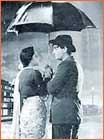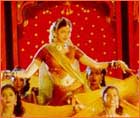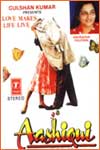Romancing the Hindi film song!
Suparn Verma
 It has always been a grouse for discerning audiences: Hindi film songs.
It has always been a grouse for discerning audiences: Hindi film songs.
Can a Hindi film be made without songs and be successful?
Maybe.
Can you remember one songless film that went on to become a major BO hit?
I don't.
Fact is that today, music has nothing to do with a film. It has more to do with a very intricate part of the economics of the film. And that involves distribution deals, the publicity of the film -- especially airtime on television -- making it a need-to-watch film before it releases.
A glimpse of the history of Indian films dates back to our culture of Nautankis, Ram Leelas, song and dance.
Indeed, music and theatre have been the biggest entertainers the world over.
Films started off being soundless, silent. Not far behind followed live accompanists playing tunes, which served as a musical score. When voice came in, the first actors were also singers in their own right.
 The concept of a film was mixing drama with music and songs to give the audiences, who had to cross many villages to watch a film, a complete experience which satiated all their needs.
The concept of a film was mixing drama with music and songs to give the audiences, who had to cross many villages to watch a film, a complete experience which satiated all their needs.
This gave rise to the basic format of a story where the first half would be comic, the second emotional and the last half would have fights.
For relief through the proceedings, songs were introduced, which could also be sung along.
It was much later that music companies released the music on LP records.
But unlike today, films made the songs popular. You wouldn't find the music of the film in the market two months before the film released. Moreover, radio was the only means of promoting the music of a film, as well as playing audio trailers of the film.
As time passed, music became a crutch or device for filmmakers with a poor script to pad the story.
Soon, there was a television in every home. Every day, a new channel would be launched. Music companies increased in number.
And Gulshan Kumar of T-Series paved the way for minting money through music. His cheaply priced tapes broke the back of the industry and the older bigger players.
 On an average, T-Series released 100 albums a month which included Kumar's band of singers resinging old classics, ghazals, qawwalis, bhajans, etc. Since copyright laws in India were and are almost nonexistent, Kumar made a killing.
On an average, T-Series released 100 albums a month which included Kumar's band of singers resinging old classics, ghazals, qawwalis, bhajans, etc. Since copyright laws in India were and are almost nonexistent, Kumar made a killing.
But music come to the fore again.
Music companies saw the potential of making big bucks with contemporary film music besides their catalogues evergreen songs. This time, they had a new ally -- television channels.
These channels knew that to get a readymade audience, they needed to churn out popular entertainment programmes besides making soaps and sitcoms. Countdown shows started. Their fodder was film songs.
What with the music market opening up, filmmakers could use this to their advantage in many ways.
Big starcast films with wellknown music directors sold their music for huge sums of money. In recent times, for example, Taal got over Rs 5 crores from Tips, the Barjatyas made a killing with Hum Aap Ke Hain Koun...! and again with Hum Saath Saath Hain.
 Yash Chopra, who has always been savvy, made some cool deals with HMV, like the Barjatyas, on Dilwale Dulhania Le Jayenge.
Yash Chopra, who has always been savvy, made some cool deals with HMV, like the Barjatyas, on Dilwale Dulhania Le Jayenge.
With Mohabbatein they even set a record by earning Rs 11.5 crores for the music rights.
Today, music works for the film in the following ways: It gets the producers a huge sum of money upfront. In many cases, for big producers, the rights are sold when the casting of the film is announced along with the music composers name. A R Rahman, Jatin Lalit and Anu Malik being top of the line music composers.
Songs make for massive pre publicity for a film, because if one song in an album becomes a rage, it gets aired on every countdown show, all music-based programmes, plus it creates an awareness about the film with the audiences.
Many films are also sold to distributors around the time of a film's audio release.
If the songs have been shot in Switzerland, for example, that ups the value of a film. It would, in distributor lingo, have a 'look' about it. This is also an indication of the producer's seriousness about his film.
 Most Hindi films are ready only a day or two before the its release. So it is largely on song picturisation that most distributors make up their mind, besides of course, the clincher -- the starcast.
Most Hindi films are ready only a day or two before the its release. So it is largely on song picturisation that most distributors make up their mind, besides of course, the clincher -- the starcast.
Directors like Mani Ratnam, Ramgopal Varma, Yash Johar, Subhash Ghai, Sooraj Barjatiya, Karan Johar, Aditya Chopra, Shankar, are people who have realised the importance of music in their films and have incorporated songs in the film either as part of the narrative or setpieces.
For example, Shankar shot one of the songs in Jeans, around the seven wonders of the world. His Kaadalan song with Prabhu Deva had him dancing with the special effects.
Mani Ratnam's Roja song with the old ladies, or the Thiruda Thiruda song with Anu Agarwal were all part of the overall image, which became a rage before the films were released.
Incidentally, film songs have been detrimental to the growth of pop music in India. Films songs are so much part of our popular culture that pop songs can never ever complete with them in terms of quality, quantity and reach.
 Hollywood has a vibrant pop culture. If you notice, most successful music soundtracks license all-time great songs in their films. Hence they have a surplus catalogue market which is dependant on films and the advertising industry.
Hollywood has a vibrant pop culture. If you notice, most successful music soundtracks license all-time great songs in their films. Hence they have a surplus catalogue market which is dependant on films and the advertising industry.
In recent times, Moby has been widely used in advertisements and films like Heat, The Beach.
A look at the recent Matrix or MI-2 compilations show the very best of pop musicians employed to give the films' soundtrack a unqiue pop feel.
Coming back to Hindi films, one entity that film songs drove out of existence are film trailers. No Hindi film has a trailer anymore.
Before the invasion of television channels, properly designed or poorly designed film trailers would be screened in cinema halls. Today, no music channel will play an advertisment for a film because that would eat into its revenue.
However, it will play song clips for free because it is free software for the channel. Hence, producers who are basically interested in visibility for the film don't find the need to create trailers for a film anymore.
 Indian film songs many a time ruin a good narrative, because the song has to be included in the film.
Indian film songs many a time ruin a good narrative, because the song has to be included in the film.
But this is a snake whose head you cannot cut, because of the very structure of the economics of filmmaking, it is inevitable that a filmmaker include songs in his films.
Dancing around trees? No, that won't go away. Not for a long time.